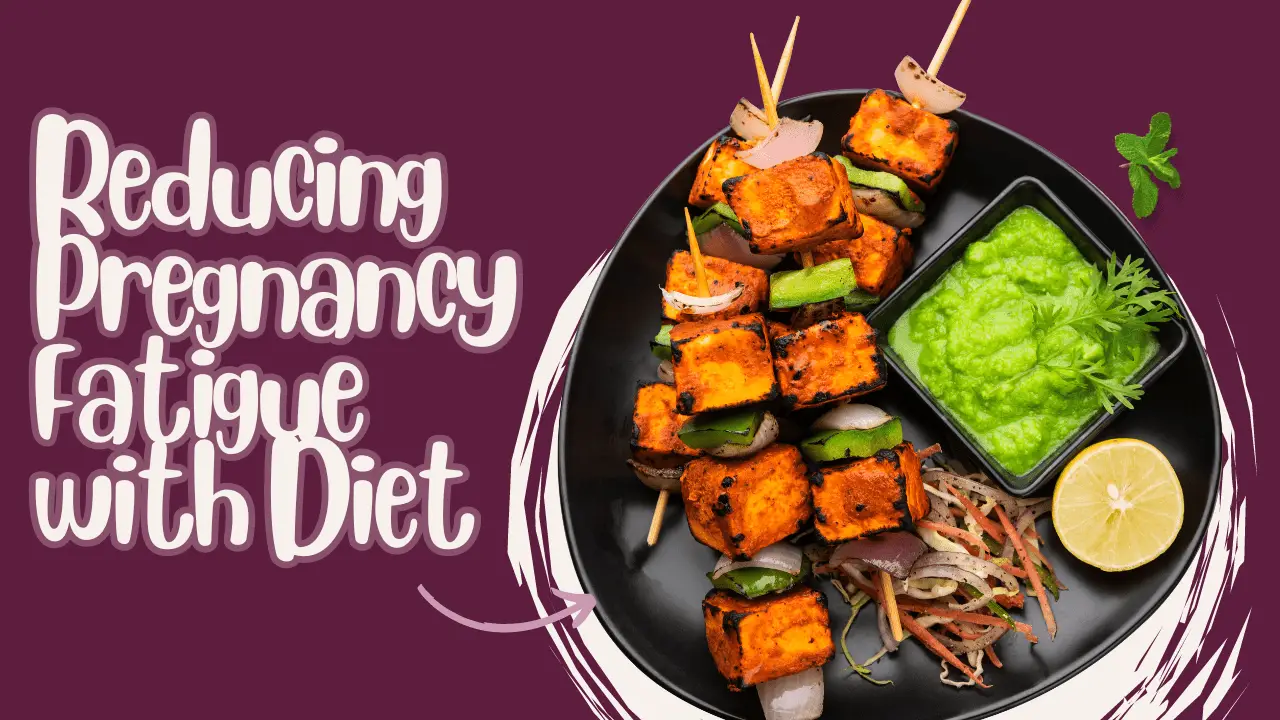While being pregnant is an amazing experience, there are certain difficulties that come with it, such as a constant sense of exhaustion. You may feel more exhausted than usual during this time since your body is working so hard to support the growth of your kid.
Paying attention to your nutrition is one practical strategy to combat chronic tiredness. Having enough nutrition can make a big difference in how much energy you have throughout the day. We’ll look at ten practical dietary strategies in this blog post to lessen pregnant fatigue.
You may increase your energy, maintain an active lifestyle, and have a healthier pregnancy by using these dietary guidelines. Now let’s get into the advice that will significantly improve your daily mood.
Pregnancy Fatigue:
Pregnancy fatigue is a common experience for many expectant mothers. It can begin early in the first trimester and often persists throughout the pregnancy. This overwhelming tiredness is due to several factors that combine to make daily tasks feel more exhausting than usual. Understanding the causes and symptoms of pregnancy fatigue is the first step toward managing it effectively.

Causes of Pregnancy Fatigue:
One primary cause of pregnancy fatigue is the hormonal changes that occur in your body. The surge in progesterone levels, while essential for maintaining a healthy pregnancy, can also make you feel sleepier and more sluggish.
Additionally, your body is working harder to support the growing baby, which increases your metabolic rate and energy expenditure. This increased workload can leave you feeling drained, especially in the early and late stages of pregnancy.
Common Symptoms
You can better manage pregnancy fatigue if you are aware of its signs. Prolonged fatigue, trouble focusing, and unusually high or low emotions or irritability are common symptoms. You might also discover that you require more sleep than usual or that it’s difficult for you to stay awake during the day.
Although the severity of these symptoms varies from woman to woman, they are a typical aspect of pregnancy. The key to reducing pregnancy fatigue with diet is to choose foods that will increase your energy and general well-being.

You can give your body the fuel it needs to handle the demands of pregnancy by emphasizing nutrient-rich foods and well-balanced meals, which can lessen weariness and increase your everyday vitality.
Reducing Pregnancy Fatigue with Diet:
Reducing pregnancy fatigue with diet is a practical and effective approach to maintaining energy levels during pregnancy. A well-balanced diet provides the essential nutrients your body needs to support both your health and your baby’s development. By making mindful food choices, you can combat fatigue and enhance your overall well-being.
Explanation of How Diet Affects Energy Levels
Your energy levels are strongly impacted by the things you eat. Your body uses all of these nutrients—carbs, proteins, fats, vitamins, and minerals—independently of one another. For example, the body uses carbohydrates as its main energy source to power daily tasks.
Whole grains and other complex carbs release energy gradually, assisting in maintaining energy levels throughout the day. While healthy fats are essential for hormone production and cognitive function, proteins are critical for muscle growth and repair.
Iron and magnesium are two examples of vitamins and minerals that are crucial for avoiding shortages that can cause weariness.
Introduction to the Tips
Pregnancy fatigue can be considerably decreased by implementing particular dietary techniques. In order to guarantee that you have the energy to handle the increased physical demands of pregnancy, these guidelines center on maximizing your food intake.
For instance, eating small, frequent meals can help keep blood sugar levels constant and stave off energy slumps. Iron-rich meals like lean meats and leafy greens can help fight anemia, which is a major pregnancy fatigue reason. It is equally crucial to stay hydrated because being dehydrated might make you feel even more exhausted.
You can effectively alleviate fatigue and have a healthier, more energetic pregnancy by adhering to these nutritional guidelines. Making educated decisions about what to eat and when to eat it will help reduce pregnant fatigue by giving your body the finest nourishment possible.
10 Effective Tips for Reducing Pregnancy Fatigue with Diet:
When it comes to managing the overwhelming tiredness that often accompanies pregnancy, making the right dietary choices can make a significant difference. Here are 10 effective tips for reducing pregnancy fatigue with diet, each designed to help you stay energized and healthy throughout your pregnancy.
-
Eat Small, Frequent Meals
Eating smaller meals more frequently throughout the day can help maintain stable blood sugar levels. This prevents the energy crashes that often follow large meals and keeps your energy levels more consistent.
-
Include Iron-Rich Foods
Iron is crucial for preventing anemia, which can cause severe fatigue. Incorporate iron-rich foods like lean meats, leafy greens, beans, and fortified cereals into your diet to boost your iron levels.
-
Stay Hydrated
Dehydration can lead to tiredness and headaches. Ensure you’re drinking plenty of water throughout the day to stay hydrated and maintain your energy levels.
-
Incorporate Lean Proteins
Proteins are essential for muscle repair and energy. Include sources like chicken, fish, eggs, and legumes in your diet to support your body’s increased needs during pregnancy.
-
Choose Complex Carbohydrates
Complex carbohydrates, such as whole grains, oats, and brown rice, provide a steady release of energy, helping to avoid the spikes and crashes associated with simple carbs.
-
Snack on Nuts and Seeds
Nuts and seeds are packed with protein, healthy fats, and fiber, making them excellent snacks to keep your energy up between meals.
-
Add Leafy Greens to Your Meals
Leafy greens like spinach and kale are rich in iron, calcium, and other essential nutrients. Including them in your meals can help combat fatigue and support overall health.
-
Limit Sugar Intake
While sugary foods and drinks can give a quick energy boost, they often lead to a subsequent crash. Limiting sugar can help maintain more stable energy levels.
-
Opt for Healthy Fats
Healthy fats found in avocados, olive oil, and fatty fish are crucial for brain function and hormone production. These fats can help you feel more satiated and energetic.
-
Avoid Caffeine
While it might be tempting to reach for a cup of coffee, caffeine can interfere with sleep and contribute to fatigue. Opt for decaffeinated options and herbal teas instead.
By implementing these tips, you can create a balanced diet that supports your energy needs throughout your pregnancy. Reducing pregnancy fatigue with diet involves thoughtful planning and making nutritious choices that benefit both you and your baby.
Additional Tips:
In addition to dietary adjustments, there are several other strategies that can help in reducing pregnancy fatigue. These complementary approaches, combined with a balanced diet, can significantly improve your energy levels and overall well-being.
Importance of Regular Exercise
Regular exercise can boost your energy, improve your mood, and help you sleep better. Engaging in moderate activities like walking, swimming, or prenatal yoga can enhance blood circulation and release endorphins, which are natural mood lifters.

Aim for at least 30 minutes of physical activity most days of the week, but always consult your healthcare provider before starting any new exercise regimen.
Getting Adequate Sleep
Quality sleep is crucial during pregnancy, as your body needs extra rest to support your baby’s growth and development. Set a consistent sleep schedule by going to bed and waking up at the same time every day.
Create a relaxing bedtime ritual, such as reading a book or taking a warm bath, to signal to your body that it’s time to wind down. Ensure your sleeping environment is comfortable, with a supportive mattress and pillows that accommodate your changing body.

Managing Stress
Stress can lead to fatigue and exhaustion. Try stress-reducing techniques such as deep breathing exercises, meditation, or prenatal massage. Connecting with other expectant mothers through support groups can also provide emotional support and reduce feelings of isolation.
Nutritional Supplements
While a balanced diet is the best way to get essential nutrients, sometimes additional supplements might be necessary. Prenatal vitamins are designed to fill any nutritional gaps and ensure you and your baby get the nutrients you need. Consult your healthcare provider before taking any supplements to ensure they are safe and appropriate for your specific needs.

Staying Hydrated
It’s critical to stay hydrated to sustain energy levels and avoid dehydration, which can cause fatigue. During the day, sip on lots of water and think about eating foods high in water content, such as fruits and vegetables.
Together with your dietary adjustments, you can use these extra suggestions to develop a whole pregnancy fatigue reduction strategy. Recall that maintaining these healthful lifestyle practices along with a diet that reduces pregnancy fatigue will help you feel your best throughout your pregnancy.
Conclusion:
In conclusion, a great way to keep your energy and general well-being throughout pregnancy is to reduce pregnancy fatigue with nutrition. You may effectively manage fatigue and have a healthier pregnancy by consuming nutrient-dense foods, drinking plenty of water, and paying attention to the extra advice given.
To support your body’s demands, keep in mind that a balanced diet and healthy lifestyle choices are essential. Accept these tips to make sure you and your child survive this amazing journey. Click to learn more.
FAQs:
- Can diet alone help in reducing pregnancy fatigue?
-
- While diet plays a crucial role, combining healthy eating with regular exercise, adequate sleep, and stress management offers the best results for reducing pregnancy fatigue.
- What are some quick energy-boosting snacks for pregnant women?
-
- Nuts, seeds, yogurt, fruit, and whole-grain crackers are excellent choices for quick energy-boosting snacks.
- How much water should I drink to stay hydrated during pregnancy?
-
- Aim for at least 8-10 glasses of water daily, but your needs may vary. Always consult your healthcare provider for personalized advice.
- Are there specific foods I should avoid to prevent pregnancy fatigue?
-
- Avoid processed foods, excessive sugar, and high-caffeine beverages, as they can lead to energy crashes and increased fatigue.
- Can prenatal vitamins help with pregnancy fatigue?
-
- Yes, prenatal vitamins can help fill nutritional gaps and support overall health, which may reduce fatigue. Consult your healthcare provider to ensure you’re taking the right supplements.
